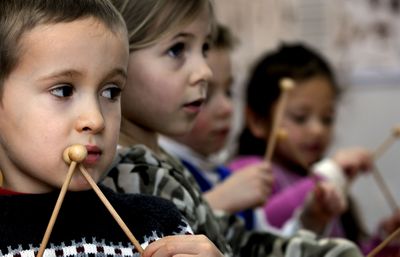Taking notes for success
Kindermusik program intends to trigger learning behaviors beyond the music

Children twirl under a sea of scarves, experiment with age-appropriate instruments, sing about a scampering squirrel, create a musical ensemble, and just love it.
“That’s the power of Kindermusik,” according to Kindermusik with Family Rhythms owner and educator Vi Conrad of Post Falls.
Conrad and husband George have been teaching Kindermusik in Coeur d’Alene for 12 years. They began with 12 students and now they have 100 to 140 children, from newborn to 7 years old, enrolled in their program.
Kindermusik is a music and movement program that originated from Germany, that brings music to children’s lives that stimulates, strengthens, and contributes to their overall growth and development.
Kindermusik’s philosophy is based on the belief that a parent or loving caregiver is a child’s first and most important teacher and that all children are musical. It believes that music nurtures a child’s cognitive, emotional, social, language and physical development. Children explore vocal sounds and singing, which also foster the development of their voice.
Research supports the belief that early music experiences can have a significant impact on literacy, reading, and even cognitive growth in certain other nonmusical abilities such as math, memory and spatial-temporal reasoning.
George Conrad is an attorney and has had 15 years of classical piano training while growing up in Las Vegas. He performs with the North Idaho College Jazz Ensemble and Coeur d’Alene Summer Theatre as time allows, and composes music including jazz, classical and rock and roll.
Vi Conrad is a childhood development specialist with a bachelor of science degree in elementary education from the University of Nevada-Las Vegas.
The Conrads started as Kindermusik parents themselves.
Both became passionate about teaching Kindermusik when their son, Jared, was 3. They wanted to spend more time with him, and music was something he loved.
“It seemed like a natural extension of what he was doing,” said Conrad. “By the time he was 7 he would play music while I cooked dinner each night, and get excited.”
“Kindermusik offers a movement oriented, developmentally friendly alternative to making 5- to 6-year-olds practice an instrument for 20 minutes a day,” said Conrad.
At all levels, Kindermusik teaches the simple concepts of rhythm, beat and pitch. By age 5 children also begin to learn note reading and simple composition. By age 7 they have learned to play three simple instruments that let them decide if they best like tapping, strumming or blowing.
Parents are involved in the musical education of their child and often participate in class. They serve as teachers during the week with the program’s take home books, instruments, and CDs which help parents strengthen their emotional bond with their child.
Parent Janine Wilson sings praises about the Kindermusik program.
“The Conrads have a special way,” said Wilson.
“They are able to tap into children’s abilities to listen and play music even when the children don’t know it.”
After attending one class, Wilson said her 5-year-old twins were thrilled – marching around, singing, beating on the resonator bars and playing games.
Kindermusik really is a community of families who offer social support to each other, said Conrad. For example, when a student’s mother was injured in a car accident, the other moms formed a “casserole/cleaning team” offering to help however they could.
The Conrads love teaching and say that “Every child should experience the joy, fun and learning that music brings to life.”